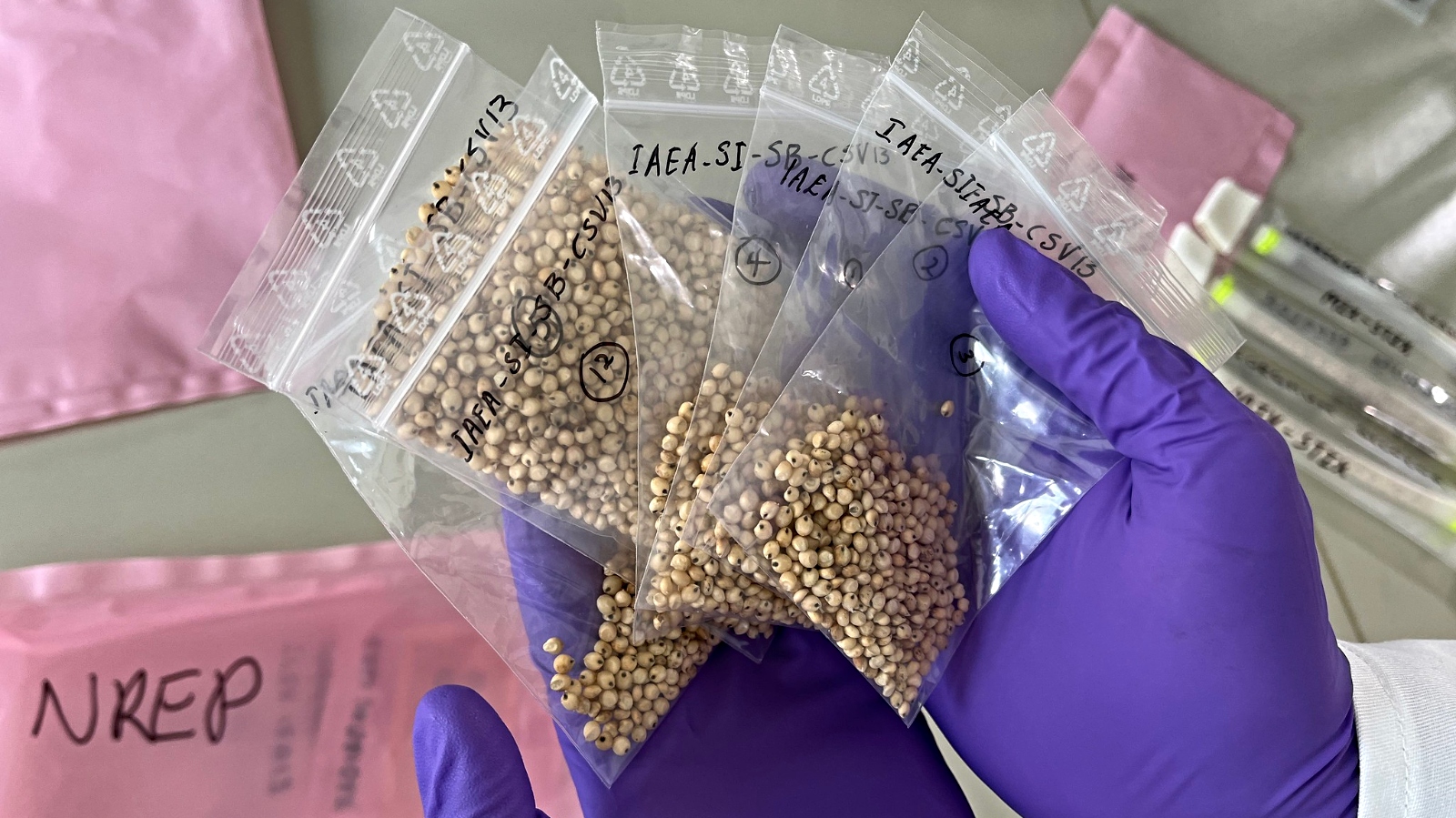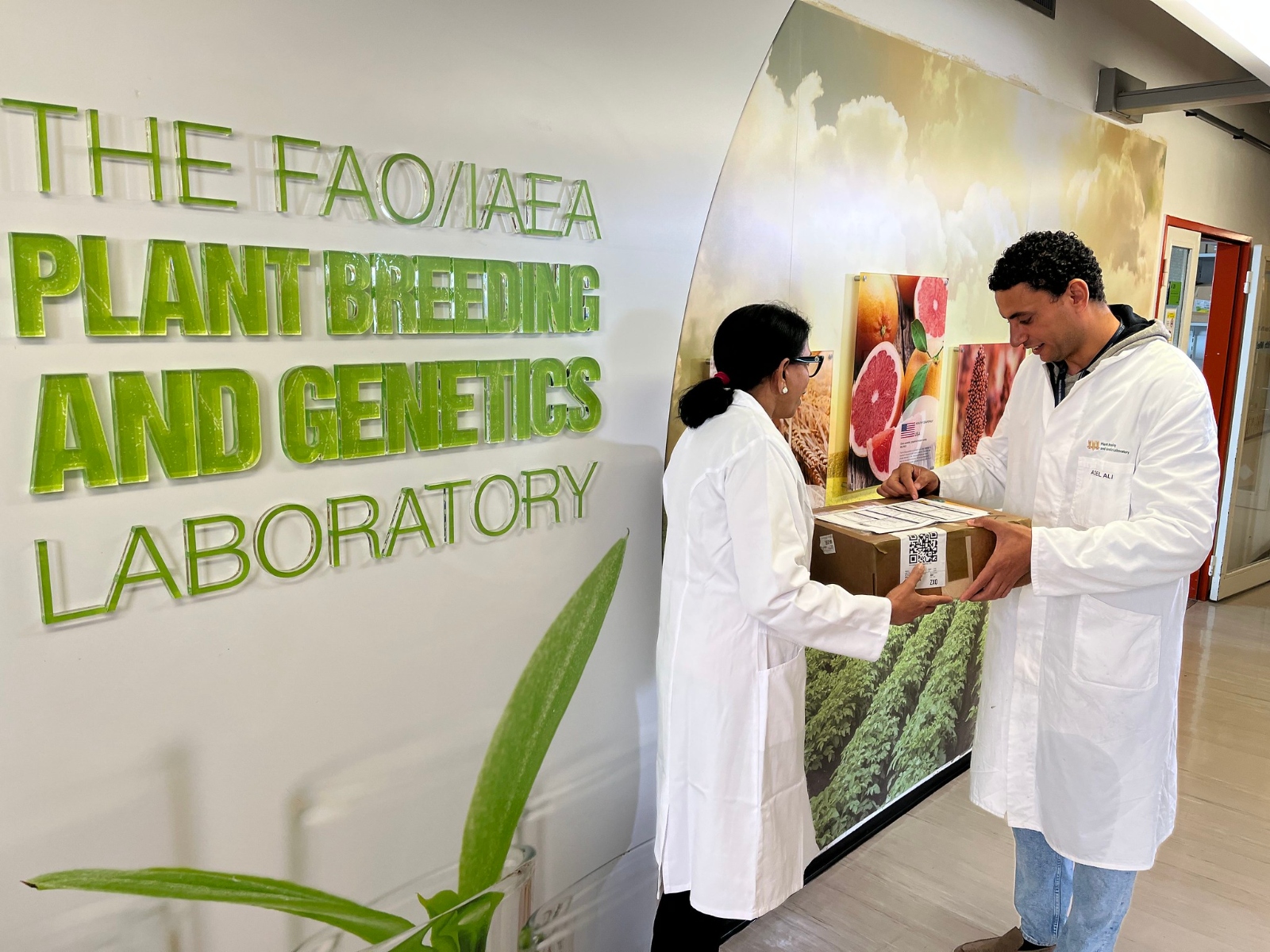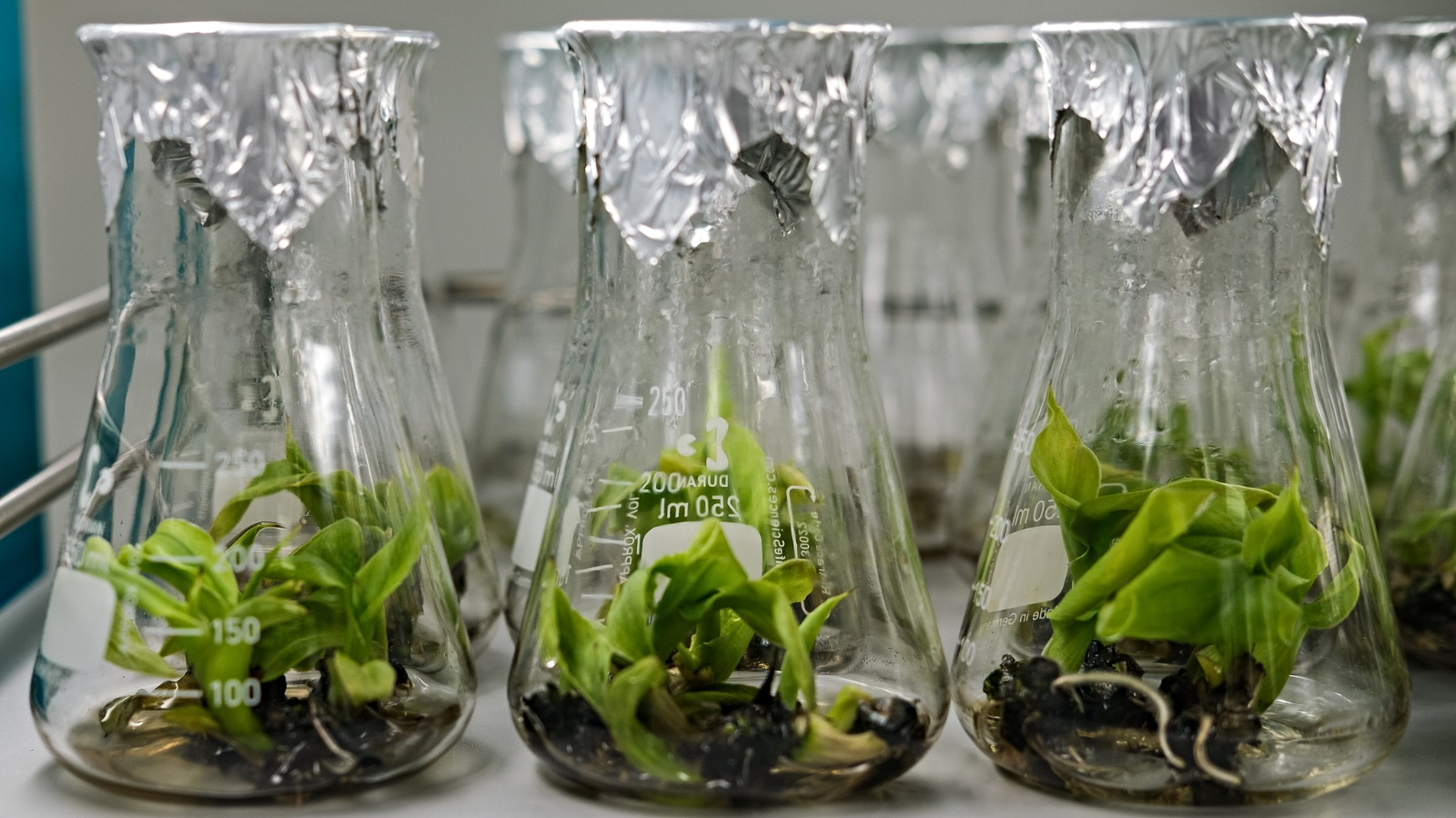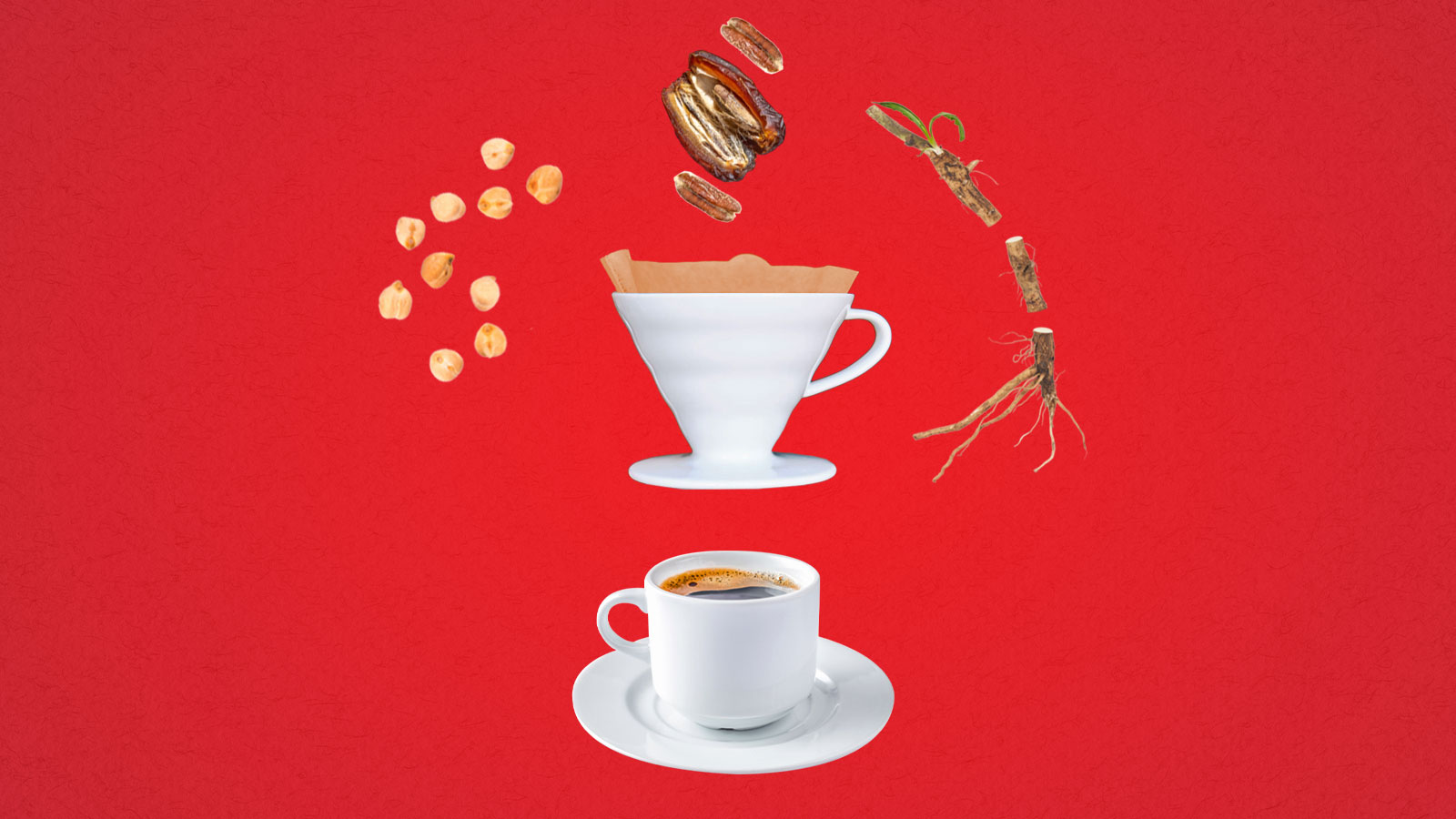In early April of last year, a white capsule the size of a small school bus detached from the International Space Station and splashed down off the coast of Tampa, Florida. On board were 4,300 pounds of supplies and scientific experiments, including samples of dwarf tomatoes grown in space; crystals that could be used to make semiconductors; and medical data on the astronauts working in the space station. Tucked away among these contents was a much smaller and lighter cargo: more than a million tiny orange seeds.
Half a world away in Seibersdorf, Austria, a town about 22 miles outside the capital of Vienna, Pooja Mathur waited eagerly for the seeds — from a plant called arabidopsis, a member of the mustard family — to arrive. Mathur, a plant geneticist, leads the Plant Breeding & Genetics Laboratory for the Joint FAO/IAEA Centre of Nuclear Techniques in Food and Agriculture, a collaboration between two United Nations agencies: the Food and Agriculture Organization and the International Atomic Energy Agency.
For over 60 years, the laboratory has studied whether nuclear technologies can be used to breed new and more resilient varieties of crops, and the seeds from the space capsule were its newest venture. They had spent nearly five months in low earth orbit, exposed to cosmic radiation, extreme temperatures, and low gravity, which altered their DNA in unpredictable but potentially beneficial ways. Scientists like Mathur hope that a few of these seeds might sprout into plants that can survive changing conditions here on Earth, such varieties more resistant to drought or heat.

An expert at the Plant Breeding and Genetics Laboratory holds the sorghum seeds that spent five months at the International Space Station.
Katy Laffan / IAEA
“It was a great opportunity to receive them,” Mathur told Grist over a video call from her office in Austria. “But there was also a nervousness — there are always these questions when you embark on something unknown.”
The “cosmic crops” project is the United Nations’ first foray into space breeding, part of a global effort to address rising risks of food insecurity stemming from shifting land use patterns, population growth, and climate change-driven extreme weather. Heat waves, droughts, floods, erratic rainfall, and worsening pest and disease outbreaks all threaten agricultural production around the world, and the effects are already being felt in many countries. Massive flooding destroyed at least 4 million acres of farmland in Pakistan in 2022, triggering a food crisis for more than 8 million people; in East Africa, extreme drought has pushed millions of people to the brink of famine in the past three years. In the United States, natural disasters, many made worse by climate change, caused $21.5 billion in agricultural losses in 2022 alone.
While space breeding seeds was first attempted in the 1960s, the scientific endeavor is currently experiencing a golden age as space travel and research becomes more accessible for nations outside the U.S., Russia, and Europe. Chinese researchers have been at the forefront of this experimentation, developing more than 200 varieties of space-mutated plants since 1987. Other countries that have developed space programs in recent years, like India and the United Arab Emirates, are also among the most vulnerable to climate change, and have expressed interest in the technology.
But the joint FAO/IAEA center’s project, known officially as Seeds in Space, is the first such effort on an international level, which will help make the results of these experiments available even to nations that can’t afford to build rockets or extensive plant genetics laboratories. And it will help answer essential questions about what makes space mutations different from those done here on earth, and where scientists should direct their efforts in order to adapt to climate change.
“[If] we can understand how plants mitigate stress [in a space environment], we can use that knowledge in our approach to global warming on earth,” said Tapan Mohanta, a former agricultural researcher at the University of Nizwa in Oman who has studied the potential of space breeding for developing new crop varieties and was not involved in the FAO/IAEA mission.
The joint FAO/IAEA center was founded in 1964 amidst a post-war push to use atomic energy for peaceful means. Researchers at the time found that exposing plant material to radiation encourages mutations at a much faster rate than conventional breeding, a painstaking procedure that requires multiple generations to show changes in the plants’ phenotype, or outward characteristics. Mutations occur naturally as cells multiply by making copies of their genetic code; what starts as a random error in one strand of DNA can be replicated over and over again until the organism either repairs the damage or allows it to spread to all of its cells.

Scientist Shoba Sivasankar, right, receives a package of seeds that journeyed from the International Space Station to the FAO/IAEA Plant Breeding and Genetics Laboratory in Seibersdorf, Austria, in 2023.
Katy Laffan / IAEA
Hitting seeds with gamma rays, the most powerful form of radiation, speeds up this process, known as “mutagenesis,” by as much as 1 million times. Irradiated seeds which survive the high doses of radiation can grow into plants that show much clearer phenotype variations than their conventionally-bred counterparts; scientists can then test these new specimens to see whether they can withstand difficult conditions or produce a higher crop yield than currently existing varieties. This process does not make the seeds themselves radioactive, and the resulting crops are safe to eat, Mathur said.
By selecting and then further breeding the most promising candidates, researchers have produced over 3,400 new varieties of more than 210 plant species, according to the IAEA’s Mutant Variety Database. Farmers in more than 70 countries are already growing the resulting plants; the seeds are often crossbred with widely used “elite” varieties to better suit local conditions. Other mutations can be induced using chemicals, bypassing nuclear technology altogether.
Cosmic rays, which are emitted by distant space objects like the sun, other stars, and even black holes, offer a different way to trigger mutagenesis, Mathur said. One of the goals of the “cosmic crops” project is to determine whether radiation from space, which is lower intensity but applied over a longer period of time than in the lab, can create different results than experiments with gamma rays on earth. Previous experiments by Chinese researchers have found that space radiation induces “useful” mutations more often than gamma radiation applied in a lab, according to the BBC.
“Mutagenesis is a very slow process on a day-to-day basis,” Mathur said. Space breeding “can accelerate the process to harness the power of natural changes at a much faster scale, considering that there is a dire need to have solutions in food and agriculture.”
Two types of seeds were picked for the experiment: arabidopsis, a weed that, while usually not edible, is a “model species” with a well-studied genome that researchers can quickly examine for the most obvious genetic changes and useful traits, and sorghum, a dryland crop that’s consumed by 500 million people around the world and is therefore useful from a food security standpoint, Mathur said. Half were kept outside the International Space Station, where they were exposed to the full range of cosmic radiation along with the extreme cold and zero-gravity environment of outer space; the other half stayed inside the station, under microgravity conditions but shielded from most radiation, to provide a point of comparison.
Because the mutations that occurred in space were random, scientists are taking two approaches to figure out what they look like: Since receiving the seeds in June of last year, Mathur’s lab has planted them and will now begin using DNA sequencing technology to study the arabidopsis seedlings and determine what changes took place at the genetic level. They plan to have results by summer or early fall. After that, researchers will screen the ones that seem to display positive genetic changes to determine whether they can actually better withstand harsh conditions like drought, salinity, and pest infestations. They’ll follow up by testing the sorghum, which takes longer to sprout and grow to maturity.

Crops take root in a beaker at the IAEA Plant Breeding Unit in Seibersdorf, Austria.
Adriana Vargas Terrones / IAEA
Mathur’s lab is sharing its results with countries that want to learn which techniques — encompassing everything from the length of time the seeds are in space to the way they’re grown once they return — produce the most resilient crop varieties. One such “coordinated research project,” which would compare mutations induced by cosmic rays with those applied in the lab, has attracted researchers from Australia, Burkina Faso, China, France, Ghana, India, Kenya, Niger, South Korea, the United Kingdom, and the U.S.
“The molecular variations in plants induced by space mutagenesis are largely unknown,” said Hongchun Xiong, an associate professor at the Chinese Academy of Agricultural Sciences who is working on the coordinated research project. Although Xiong’s previous research using space-exposed seeds has identified mutant varieties of wheat that are more tolerant to saline soil, which can prove useful as saltwater encroaches on agricultural fields thanks to rising sea levels, she hopes to identify others that are resistant to dry conditions or use nitrogen more efficiently.
“We believe this is important for [the] development of new wheat varieties for food security and climate-change adaptation,” Xiong said.
Previous experiments with space breeding have already yielded results. China registered a new variety of wheat called Yannong 5158, which was developed using space mutagenesis, in 2007. Smaller than conventional wheat, with dark green leaves, this version proved more resistant to bacterial diseases and stem rust, a type of fungal infection, while also producing a higher yield. This variety has since been planted in several villages in the Fuyang prefecture in eastern China. The country also harvested its first batch of rice that had traveled to deep space — nicknamed “rice from heaven” by state media — in 2021, though it has not yet announced whether the resulting plants were more resilient in any way than their earth-bred counterparts.
Experiments like these carry risks, Mohanta pointed out. Mutant DNA could potentially escape and contaminate wild species or other crops through cross-pollination, which could pose a threat to biodiversity or human health if the mutations are harmful in any way — a small possibility, but one that plant breeders developing genetically modified organisms, or GMOs, also face. One genetically modified variety of corn, for example, was suspected of unintentionally introducing allergens into the U.S. food supply in the early 2000s and later had to be recalled, although officials could not prove that the GMO corn actually caused allergic reactions. And although contamination incidents are common, with nearly 400 recorded by Greenpeace between 1997 and 2014, researchers have found no definitive links between GMO foods and negative health effects.
Read Next

While space-bred varieties are not GMOs, because the mutations that occur are random and not controlled by humans, the joint FAO/IAEA center still follows protocols to keep cross-contamination from occurring. But it can’t control what member states do once they have access to the technology and mutated seeds.
“Although developing plant varieties that thrive in microgravity and resist cosmic radiation may be an important goal for the scientific community, an undesirable mutation in the genome could have deleterious effects on other crop varieties,” Mohanta wrote in a 2021 paper in the journal Frontiers in Plant Science. “Therefore, the conduct of such research should be subject to strict international regulations to avoid the possibility of unexpected results.”
Mathur emphasized, though, that despite the unknowns, space breeding has enormous potential, which scientists are only just beginning to unpack. She pointed to previous studies that found peppers exposed to cosmic radiation had a higher nutritional content, a promising feature given widespread deficiencies of iron, zinc, vitamin A, and other nutrients around the world. And although space experiments are still a very small component of plant breeding, the results of the “cosmic crops” project will help researchers decide whether to invest more into this technology in the future.
Mutation breeding “has been the cornerstone of agriculture for a long, long time,” Mathur said. “Agriculture is all about harnessing mutations … and mutation is very much a part of our evolutionary process.”
>>> Read full article>>>
Copyright for syndicated content belongs to the linked Source : Grist – https://grist.org/food-and-agriculture/can-the-harsh-conditions-of-space-breed-more-resistant-crops-for-earth/










